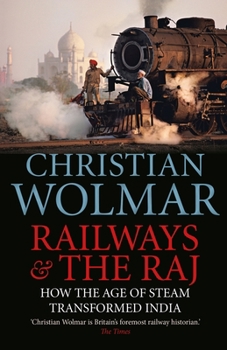Railways & the Raj: How the Age of Steam Transformed India
Select Format
Select Condition 
Book Overview
India was the jewel in the crown of the British Empire, with vast riches to be exploited and vast numbers of people to be subjugated. How better to achieve these aims than by building a rail network that facilitated the export of raw material and made it easier for troops to travel around the country to tackle uprisings? India joined the railway age late: the first line was not completed until 1853 but, by 1929, 41,000 miles of track served the country. This was not intended to modernize India for the sake of its people but rather was a means for the colonial power to govern the huge country under its control. The railways radically changed the nation but also unwittingly created the preconditions of independence. Their construction ultimately contributed to a stirring of nationalist opinion, as resentment grew among the Indian population over the conditions they endured when traveling by train and the barring of Indians from the better paid railway jobs. Despite the dubious intentions behind the construction of the network, the Indian people quickly took to the railways, as the trains allowed them to travel easily for the first time. The Indian Railways network remains one of the largest in the world, serving more than 25 million passengers each day. In this expertly told history, Christian Wolmar reveals the full story of India's railways, from its very beginnings to the present day.
Format:Paperback
Language:English
ISBN:1782397671
ISBN13:9781782397670
Release Date:January 2019
Publisher:Atlantic Books (UK)
Length:384 Pages
Weight:0.85 lbs.
Dimensions:1.2" x 5.1" x 7.7"
Customer Reviews
0 rating





